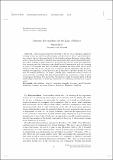Harmonic inferentialism and the logic of identity
Abstract
Inferentialism claims that the rules for the use of an expression express its meaning without any need to invoke meanings or denotations for them. Logical inferentialism endorses inferentialism specically for the logical constants. Harmonic inferentialism, as the term is introduced here, usually but not necessarily a subbranch of logical inferentialism, follows Gentzen in proposing that it is the introduction-rules whch give expressions their meaning and the elimination-rules should accord harmoniously with the meaning so given. It is proposed here that the logical expressions are those which can be given schematic rules that lie in a specific sort of harmony, general-elimination (ge) harmony, resulting from applying a certain operation, the ge-procedure, to produce ge-rules in accord with the meaning defined by the I-rules. Griffiths (2014) claims that identity cannot be given such rules, concluding that logical inferentialists are committed to ruling identity a non-logical expression. It is shown that the schematic rules for identity given in Read (2004), slightly amended, are indeed ge-harmonious, so confirming that identity is a logical notion.
Citation
Read , S 2016 , ' Harmonic inferentialism and the logic of identity ' , The Review of Symbolic Logic . https://doi.org/10.1017/S1755020316000010
Publication
The Review of Symbolic Logic
Status
Peer reviewed
ISSN
1755-0203Type
Journal article
Collections
Items in the St Andrews Research Repository are protected by copyright, with all rights reserved, unless otherwise indicated.

